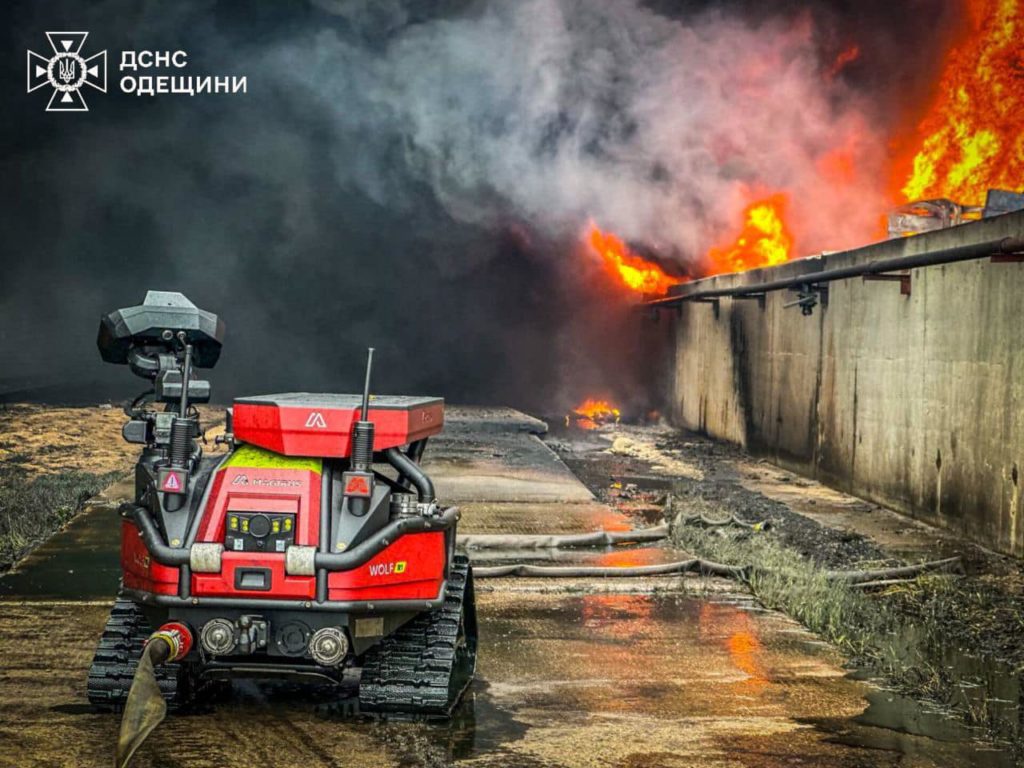Russia targets Ukrainian port, destroying grain storage and goods for Asia and Africa
For the third day in a row, Ukrainian Emergency Service employees have been eliminating the consequences of the assault.


On 19 April, Russian troops hit the port of Pivdennyi in Ukraine’s southern Odesa Oblast, destroying grain storage facilities and foodstuffs they contained, according to Ukrainian President Volodymyr Zelenskyy and other officials.
Later, the Ministry of Restoration stated that as a result of the attack on the port of Odesa, the Russian military destroyed agricultural products intended for Asia and Africa.
“Two terminals in the Port of South, specializing in the transit of agricultural products, were attacked. One of the terminals belongs to the globally known Singaporean company Delta Wilmar, which has been operating in Ukraine since 2004 and also owns several agricultural processing plants. This amounts to over $300 million in investments and nearly 1000 jobs,” the department said.
The Ministry of Restoration noted that this was the 39th Russian attack on port infrastructure facilities in the Odesa Oblast.
“Overall, 215 objects have been damaged or partially destroyed, along with 153 vehicles, eight civilian vessels, and 26 civilians injured,” the department concluded.
Zelenskyy, in a post on social media, said the air assault was “part of a deliberate Russian strategy” to destabilize Ukraine and countries relying on its food exports.
“Dear partners in the Global South, this is Russia’s true attitude towards you, your food security, and your well-being. Russia is willing to harm people in your countries in order to achieve its insane goal of destroying our country at any cost,” he stressed.
Since Russia withdrew from a UN-brokered deal that had guaranteed safe shipments of Ukrainian grain last summer, Ukraine’s port infrastructure and its employees have many times suffered from Russian missile and drone attacks.
The aggressor country has also used ballistic missiles, which can be intercepted only with Patriot air defense missile systems, to hit Ukraine’s southern oblasts. This resulted in a high number of casualties among civilians in the regions.
On 20 April, the regional department of the State Emergency Service said that rescue teams are still eliminating the aftermath of a missile strike on an industrial terminal in Odesa Oblast.
“For the third day in a row, rescuers have been working to eliminate the aftermath of the strike on the agro-industrial terminal in Odesa Oblast. Despite ongoing air raid alerts, rescue operations persist,” the statement reads.
Additionally, firefighters are using the tactical fire robot Magirus Wolf R1 from the emergency rescue unit of the State Emergency Service in Rivne Oblast to extinguish the blaze. Previously, it was used to eliminate significant fires in Zhytomyr, Lviv, Ternopil, Khmelnytskyi, and Volyn oblasts.
The Russian military regularly attacks Ukrainian regions with various types of weaponry, including drones, missiles, guided bombs, and artillery. Despite evidence and testimonies of the victims, Moscow has consistently denied deliberately targeting civilians since the beginning of the all-out war.
Recently, the UN Human Rights Monitoring Mission in Ukraine said Russia’s war killed 10,810 and injured 20,556 civilians since February 2022. The organization suspects that the actual number of civilian casualties is much higher.
Its report said that extensive coordinated attacks on critical infrastructure resulted in the destruction or damage of at least 20 energy facilities across Ukraine. This disruption temporarily cut off access to electricity for millions of people in urban and rural areas, with some regions also experiencing interruptions in water supply.
Read more:
- Elon Musk claims Odesa could fall if Russo-Ukrainian war drags on
- Missile strike on Odesa injures 10, damages 300 apartments
- Russia pounds Kharkiv with improved gliding bombs, hits Odesa with ballistic missile
- Russian missile strike on Odesa leaves children wounded



